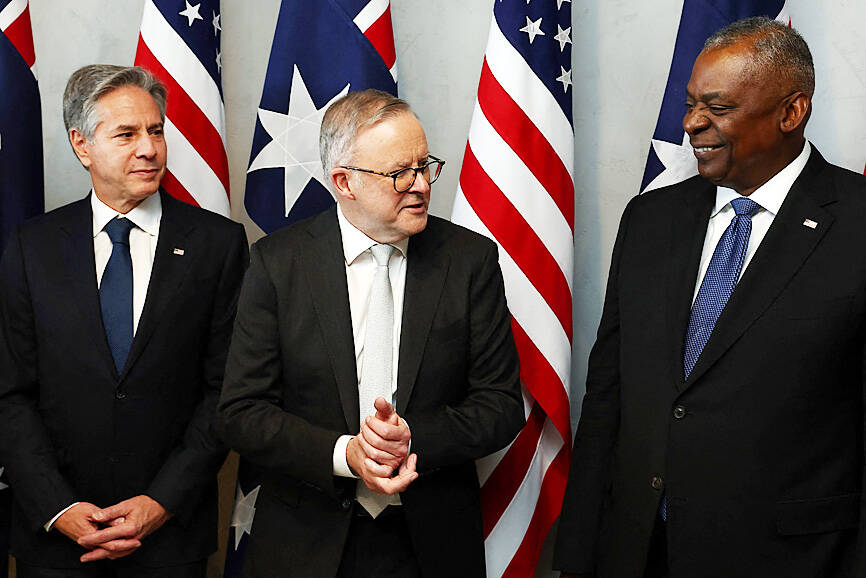Washington stands with countries fighting Chinese “bullying behavior,” US Secretary of Defense Lloyd Austin said yesterday, as he launched bilateral talks in Australia aimed at countering Beijing’s growing influence in the Indo-Pacific region.
Austin and US Secretary of State Antony Blinken arrived in the Australian city of Brisbane late on Thursday ahead of annual bilateral meetings yesterday and today that would focus on a deal to provide Australia, a defense treaty partner, with a fleet of submarines powered by US nuclear technology.
Ahead of a meeting with Australian Minister for Defense Richard Marles, Austin said both countries share concerns about China’s break from international laws and norms that resolve disputes peacefully and without coercion.

Photo: AFP
“We’ve seen troubling PRC coercion from the East China Sea, to the South China Sea, to right here in the Southwest Pacific,” Austin told reporters, referring to the People’s Republic of China.
“We’ll continue to support our allies and partners, as they defend themselves from bullying behavior,” he added.
China has imposed a series of official and unofficial trade barriers in the past few years against Australian exports, including coal, wine, barley, beef, seafood and wood. The barriers are widely seen as a punitive reaction to Australian government policy that has cost Australian exporters as much as US$15 billion a year.
Canberra’s icy relationship with Beijing was thawing since a change of Australian government at elections last year.
Meanwhile, the sharing of US nuclear secrets with Australia takes that bilateral relationship to a new level.
Australian Prime Minister Anthony Albanese is planning state visits to the US and China before the end of the year.
Under the AUKUS partnership — an acronym for Australia, the UK and the US — Australia is to buy three Virginia-class submarines from the US and build five of a new AUKUS-class submarine in cooperation with Britain.
Australian media have focused on a letter signed by more than 20 Republican lawmakers to US President Joe Biden that warned the deal would “unacceptably weaken the US fleet” without a plan to boost US submarine production.
Albanese said he remained “very confident” that the US would deliver the three submarines.
The prime minister said he had been reassured by discussions he had with Republicans and Democrats earlier this month at a NATO summit in Lithuania.
“What struck me was their unanimous support for AUKUS, their unanimous support for the relationship between the Australia and United States,” Albanese said.
Marles agreed the AUKUS program was on track.
“Congress can be a complicated place as legislation makes its way through it, but actually we’re encouraged by how quickly it is going through it and we are expecting that there will be lots of discussions on the way through,” Marles said.
“Fundamentally, we have reached an agreement with the Biden administration about how Australia acquires the nuclear-powered submarine capability and we’re proceeding along that path with pace,” he added.
Australia understood there was “pressure on the American industrial base” and would contribute to submarine production, Marles said.

The CIA has a message for Chinese government officials worried about their place in Chinese President Xi Jinping’s (習近平) government: Come work with us. The agency released two Mandarin-language videos on social media on Thursday inviting disgruntled officials to contact the CIA. The recruitment videos posted on YouTube and X racked up more than 5 million views combined in their first day. The outreach comes as CIA Director John Ratcliffe has vowed to boost the agency’s use of intelligence from human sources and its focus on China, which has recently targeted US officials with its own espionage operations. The videos are “aimed at

STEADFAST FRIEND: The bills encourage increased Taiwan-US engagement and address China’s distortion of UN Resolution 2758 to isolate Taiwan internationally The Presidential Office yesterday thanked the US House of Representatives for unanimously passing two Taiwan-related bills highlighting its solid support for Taiwan’s democracy and global participation, and for deepening bilateral relations. One of the bills, the Taiwan Assurance Implementation Act, requires the US Department of State to periodically review its guidelines for engagement with Taiwan, and report to the US Congress on the guidelines and plans to lift self-imposed limitations on US-Taiwan engagement. The other bill is the Taiwan International Solidarity Act, which clarifies that UN Resolution 2758 does not address the issue of the representation of Taiwan or its people in

US Indo-Pacific Commander Admiral Samuel Paparo on Friday expressed concern over the rate at which China is diversifying its military exercises, the Financial Times (FT) reported on Saturday. “The rates of change on the depth and breadth of their exercises is the one non-linear effect that I’ve seen in the last year that wakes me up at night or keeps me up at night,” Paparo was quoted by FT as saying while attending the annual Sedona Forum at the McCain Institute in Arizona. Paparo also expressed concern over the speed with which China was expanding its military. While the US

SHIFT: Taiwan’s better-than-expected first-quarter GDP and signs of weakness in the US have driven global capital back to emerging markets, the central bank head said The central bank yesterday blamed market speculation for the steep rise in the local currency, and urged exporters and financial institutions to stay calm and stop panic sell-offs to avoid hurting their own profitability. The nation’s top monetary policymaker said that it would step in, if necessary, to maintain order and stability in the foreign exchange market. The remarks came as the NT dollar yesterday closed up NT$0.919 to NT$30.145 against the US dollar in Taipei trading, after rising as high as NT$29.59 in intraday trading. The local currency has surged 5.85 percent against the greenback over the past two sessions, central